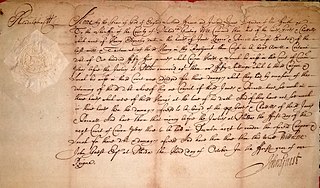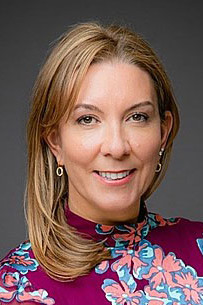
The chancellor of the exchequer, often abbreviated to chancellor, is a senior minister of the Crown within the Government of the United Kingdom, and the head of His Majesty’s Treasury. As one of the four Great Offices of State, the chancellor is a high-ranking member of the British Cabinet.

In common law, a writ is a formal written order issued by a body with administrative or judicial jurisdiction; in modern usage, this body is generally a court. Warrants, prerogative writs, subpoenas, and certiorari are common types of writs, but many forms exist and have existed.

A ceremonial mace is a highly ornamented staff of metal or wood, carried before a sovereign or other high officials in civic ceremonies by a mace-bearer, intended to represent the official's authority. The mace, as used today, derives from the original mace used as a weapon. Processions often feature maces, as on parliamentary or formal academic occasions.
Chancellor is a title of various official positions in the governments of many countries. The original chancellors were the cancellarii of Roman courts of justice—ushers, who sat at the cancelli of a basilica, which separated the judge and counsel from the audience. A chancellor's office is called a chancellery or chancery. The word is now used in the titles of many various officers in various settings. Nowadays the term is most often used to describe:

The Lord Chancellor, formally titled Lord High Chancellor of Great Britain, is a senior minister of the Crown within the Government of the United Kingdom. The lord chancellor is the minister of justice for England and Wales and the highest-ranking Great Officer of State in Scotland and England, nominally outranking the prime minister. The lord chancellor is appointed and dismissed by the sovereign on the advice of the prime minister. Prior to the union of England and Scotland into the Kingdom of Great Britain, there were separate lord chancellors for the Kingdom of England and the Kingdom of Scotland. Likewise, the Lordship of Ireland and its successor states maintained the office of lord chancellor of Ireland until the establishment of the Irish Free State in 1922, whereupon the office was abolished.

The State Opening of Parliament is a ceremonial event which formally marks the beginning of each session of the Parliament of the United Kingdom. At its core is His or Her Majesty's "gracious speech from the throne", which is read by the monarch but written by HM Government. In the speech the monarch gives notice of forthcoming state visits, before setting out the government's legislative programme for the new parliamentary session. No business of either House of Parliament can proceed until the Sovereign’s speech has been delivered.
The introduction is a ceremony in the House of Lords of the United Kingdom by which a new member is "introduced" to the existing membership. Introductions in the Lords are more elaborate than those in the House of Commons.

The Great Seal of the Realm is a seal that is used in the United Kingdom to symbolise the sovereign's approval of state documents. It is also known as the Great Seal of the United Kingdom. To make it, sealing wax is melted in a metal mould or matrix and impressed into a wax figure that is attached by cord or ribbon to documents that the monarch wishes to seal officially. The formal keeper of the seal is the Lord High Chancellor of Great Britain.
Edmund, Earl of Rutland was the fourth child and second surviving son of Richard Plantagenet, 3rd Duke of York, and Cecily Neville. He was a younger brother of Edward, Earl of March, the future King Edward IV who came to the throne in 1461, the year after Edmund's death. He was born in Rouen, then the capital of English-occupied France and his father held the office of Lieutenant of France. He was killed at the age of 17 either during or shortly after the Battle of Wakefield, during the Wars of the Roses.

The Great Seal of Scotland is a seal used by the first minister of Scotland to seal letters patent signed by the monarch giving royal assent to bills passed by the Scottish Parliament.

The Parliament of Scotland was the legislature of the Kingdom of Scotland from the 13th century until 1707. The parliament evolved during the early 13th century from the king's council of bishops and earls, with the first identifiable parliament being held in 1235 during the reign of Alexander II, when it already possessed a political and judicial role.

John de Ufford was chancellor and head of the royal administration to Edward III as well as being appointed to the Archbishopric of Canterbury.

The Clerk of the Crown in Chancery in Great Britain is a senior civil servant who is the head of the Crown Office.
Court appointments are the traditional positions within a royal, ducal, or noble household. In the early Middle Ages, when such households were established, most court officials had either domestic or military duties; the monarch's closest advisers were those who served in the household. However, as time went by, most of these positions became hereditary, and their role in the running of the household was gradually eroded. In England, for instance, the Lord Great Chamberlain and the Earl Marshal were originally responsible for the running of the royal household and the royal stables respectively; however, from the late medieval period onwards, their roles became largely honorary, their places in the household being taken by the Lord Chamberlain and the Master of the Horse.
Robert Braybrooke (1336/7-1404) was a medieval cleric and King's Secretary. He was Dean of Salisbury and Bishop of London.
The Great Seal of Ireland was the seal used until 1922 by the Dublin Castle administration to authenticate important state documents in Ireland, in the same manner as the Great Seal of the Realm in England. The Great Seal of Ireland was used from at least the 1220s in the Lordship of Ireland and the ensuing Kingdom of Ireland, and remained in use when the island became part of the United Kingdom of Great Britain and Ireland (1801–1922), just as the Great Seal of Scotland remained in use after the Act of Union 1707. After 1922, the single Great Seal of Ireland was superseded by the separate Great Seal of the Irish Free State and Great Seal of Northern Ireland for the respective jurisdictions created by the partition of Ireland.

The Crown Office in Chancery is a section of the Ministry of Justice. It has custody of the Great Seal of the Realm, and has certain administrative functions in connection with the courts and the judicial process, as well as functions relating to the electoral process for House of Commons elections, to the keeping of the Roll of the Peerage, and to the preparation of royal documents such as warrants required to pass under the royal sign-manual, fiats, letters patent, etc. In legal documents, the Crown Office refers to the office of the Clerk of the Crown in Chancery.

Letters patent, in the United Kingdom, are legal instruments generally issued by the monarch granting an office, right, title, or status to a person. Letters patent have also been used for the creation of corporations or offices, for granting city status, for granting coat of arms, and for granting royal assent.

In the United Kingdom, the Great Officers of State are traditional ministers of the Crown who either inherit their positions or are appointed to exercise certain largely ceremonial functions or to operate as members of the government. Separate Great Officers exist for England and Wales, Scotland, and formerly for Ireland, though some exist for Great Britain and the United Kingdom as a whole.











